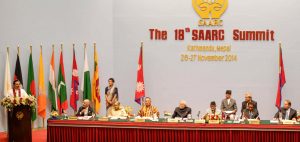[ad_1]
The Pulse | Diplomacy | South Asia
In South Asia, domestic politics often interfaces with geopolitics, presenting unexpected challenges for regional powers, big and small.

Then Sri Lankan President Mahinda Rajapaksa addressing the 18th Summit of the South Asian Association for Regional Cooperation (SAARC) at the Rashtriya Sabha Griha (City Hall) in Kathmandu, Nepal, November 26, 2014.
Credit: Flickr/Mahinda Rajapaksa
Two foreign ministers’ trips in South Asia highlight the growing complexities of India’s relationship with its smaller neighbors, as domestic politics in these countries stand to impinge on India’s desire to push back against Chinese influence there.
On January 5, Indian External Affairs Minister (EAM) S. Jaishankar began a three-day trip to Sri Lanka. According to a Ministry of External Affairs statement, Jaishankar “will hold discussions with his counterpart and Sri Lanka’s leadership on the entire gamut of bilateral relations.” “This will be the first foreign visit by EAM in 2021, and also the first by a foreign dignitary to Sri Lanka in the New Year. As such, it signifies the priority both countries attach to strengthening their close and cordial relations in all spheres of mutual interest,” it added.
Jaishankar’s visit comes on the heels of the Indian National Security Advisor (NSA) Ajit Doval’s trip to the island nation end of November last year. While Doval’s visit was primarily for a trilateral India-Maldives-Sri Lanka NSA meeting, he also took part in a range of bilateral meetings, no doubt with maintaining relations with the Rajapaksa government in Colombo on an even keel in mind. So another visit by a high-level member of the Indian cabinet – and what prompted it – little more than a month later deserves greater scrutiny.
A Hindu report on January 4 provides some answers. According to that newspaper, Jaishankar’s visit to Sri Lanka is meant to push through an Indian plan (in collaboration with Japan) to develop the East Container Terminal in the Colombo port with Sri Lanka. According to the report, the terminal was supposed to have been run through a joint partnership between Sri Lanka, India, and Japan, with Sri Lanka maintaining majority stakes in the operations company. That said, “the persisting opposition [to the project] is pegged to two major concerns — of ‘selling national assets’ to another country and the likely involvement of the Adani group,” the newspaper reports. (The Indian multinational Adani Group has previously run afoul in Australia as well.)
The report adds that Jaishankar’s visit also comes against the backdrop of a plan by the Rajapaksa government to scrap the provincial council system – something that arose out of the 1987 accord between India and Sri Lanka through the 13th Amendment of the Sri Lankan constitution, and effectively guarantees a quantum of power devolution and sharing between majority Sinhalese and the Tamil ethnic minority. Should Sri Lanka descend into Sinhalese majoritarianism under the Rajapaksa brothers, and the Tamil minority consequently be further pushed to the corner, that would raise natural concerns in New Delhi and stand to spill over on Indian domestic politics in the state of Tamil Nadu.
Media reports also note that Nepal’s foreign minister is scheduled to visit New Delhi at some point in the near future. According to one report, while the dates of Foreign Minister Pradeep Kumar Gyawali’s India trip are yet to be confirmed, the foreign affairs advisor to Nepal’s Prime Minister K.P. Sharma Oli has confirmed that “both sides are in talks” around the visit. Recall that Nepal’s President Bidya Devi Bhandari – acting on the advice of Oli – had dissolved the country’s parliament on December 20, as infighting within the ruling Nepal Communist Party (NCP) reached its peak. Bhandari has called for fresh elections in Nepal in April and May this year.
Following Bhandari’s decision, a delegation comprising of senior officials from the Chinese Communist Party arrived in Nepal on December 27 to broker peace between the warring Oli and Pushpa Kamal Dahal factions of the NCP, according to Indian media. While Oli was widely seen as being sympathetic to China – and on more than one occasion, openly antagonistic toward India – in the past, it is unclear which side is backing who at the moment. In the fluid world of South Asian politics – where the domestic and the international often interface – it is not unlikely that Oli could reach out to New Delhi to secure its support for his move to dissolve the parliament. The past few months have seen frenetic diplomatic activity between Kathmandu and New Delhi, with the Oli government hosting the chief of India’s principal intelligence service, the Indian army chief, as well as the Indian foreign secretary in quick succession.
Interestingly enough, Dahal has been in India since January 4, though accompanied by his wife who is seeking medical treatment at a hospital in Mumbai. In the past, Dahal’s ailing wife has been treated in Baltimore and Singapore.
Both Jaishankar’s trip to Colombo and the upcoming Gyawali visit clearly highlight that when it comes to India-China jostling in third, smaller, countries in South Asia, domestic politics often plays a key role in determining outcomes – but not always in the most expected of ways.
[ad_2]
Source link